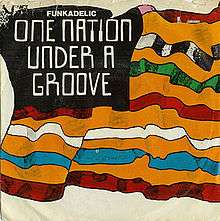One Nation Under a Groove (song)
| "One Nation Under a Groove" | |
|---|---|
 U.S. picture sleeve for the single "One Nation Under A Groove" | |
| Single by Funkadelic | |
| from the album One Nation Under a Groove | |
| B-side | "One Nation Under a Groove" (Part two) |
| Released | September 1978 |
| Format | Vinyl |
| Genre | Funk |
| Length |
Album: 7:33 7" single: 4:12 12" single: 11:26 |
| Label | Warner Bros. |
| Writer(s) | |
| Producer(s) | George Clinton |
"One Nation Under a Groove" is a 1978 song by Funkadelic, the title track from their album of the same name, The lyrics refer to dancing as a way to freedom. Compared to Funkadelic's earlier output, that was characterized by sound typical for rock music, this song has sound more typical for dance music. The 12" single of the song is an extension of the album track (this version has yet to be made available on CD).
"One Nation Under a Groove" was released as a single and reached thirty-one on the Billboard Club Play Singles chart.[1] It has endured as a dance funk classic and is probably Funkadelic's most widely known song. "One Nation Under a Groove" peaked at number twenty-eight on the Billboard Hot 100 and reached number one on the Billboard Soul chart for six weeks, the longest of any number one single released in 1978.[2] "One Nation Under a Groove" became Funkadelic's first million selling single, as well as the third million selling single for the P-Funk organization overall.
The opening lyrics, "So low you can't get under it. So high you can't get over it," may be taken from The Temptations's song "Psychedelic Shack".
The song is included in the Rock and Roll Hall of Fame's list of 500 Songs That Shaped Rock and Roll.[3] It is also ranked No. 474 on the Rolling Stone magazine's list of "the 500 Greatest Songs of All Time".
References
- ↑ Whitburn, Joel (2004). Hot Dance/Disco: 1974-2003. Record Research. p. 105.
- ↑ Whitburn, Joel (2004). Top R&B/Hip-Hop Singles: 1942-2004. Record Research. p. 450.
- ↑
External links
| Preceded by "Got to Get You into My Life" by Earth, Wind & Fire |
Billboard Hot Soul Singles number-one single September 30 - November 4, 1978 |
Succeeded by "I'm Every Woman" by Chaka Khan |